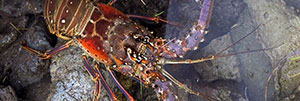
1 March – 30 June 2013: 4th simultaneous seasonal ban on Caribbean Spiny Lobster fisheries in SICA members countries
28 February 2013: The member countries of the Central American Integration System (SICA) have imposed the fourth annual joint temporary ban on capturing the Caribbean spiny lobster in order to protect the migratory species. While not yet officially declared an endangered species, scientists suspect the lobster stocks to be under heavy pressure from commercial fishing. The Central American ban, announced on 28 February 2012 by Dr. Gloria Abraham, Minister of Agriculture and Livestock of Costa Rica and Pro Tempore President of SICA/OSPESCA, in presence of Dr. Juan Daniel Alemán, General Secretary of the Central American Integration System SICA, Lic. Luis Dobles, Executive President of the Costa Rican Fisheries Institute INCOPESCA, and Lic. Mario González Recinos, Regional Coordinador Regional of OSPESCA and Steering Committee Member of the CLME Project. The 4th seasonal ban will be in effect from 1 March until 30 June. It is intended to cover the lobster's principal reproductive period. Imposed by SICA's Fisheries and Aquaculture Sector Organization of the Central American Isthmus (OSPESCA), the ban covers the entire Caribbean coastline of Central America, including Belize, Guatemala, Honduras, Nicaragua, Costa Rica and Panama. It is part of a set of mandatory measures contained in Regulation OSP-02-09, adopted by OSPESCA on 21 May 2009, after years of attempting voluntary national and/or regional bans on trapping Caribbean Spiny Lobster during the reproduction period. The seasonal ban was first imposed in 2010, and then again in 2011 and 2012.
In addition to the seasonal bans, the OSPESCA Regulation also bans altogether the capture, holding and sale of Caribbean spiny lobster found in their reproductive phase, spawned, with spermatheca or moulting; requires navigation permits; sets lobster inventories; and regulates the number of lobster pots per boat, minimum size for harvesting and trade, and escape gaps in the pots.
According to OSPESCA statistics, some 60,000 people in Central America are involved in the capture, sale and export of this lobster species, bringing some US$450 million in annual income to the region.
www.sica.int/ospesca
1 March – 30 June 2013:
4th simultaneous seasonal ban on Caribbean Spiny Lobster fisheries in SICA members countries

CATALYSING OCEAN FINANCE:
Transforming Markets to Restore and Protect the Global Ocean

NEW TECHNOLOGY
To aid in the mitigation of the Spread of Lionfish

CLME KEY PARTNER
Organization Ospesca receives important International Award

CLME PARTICIPATING
In the World Ocean Assessment Workshop

CLME SHOWCASES
Importance of UNDP´s International Waters Portfolio for supporting MPAS at CBD COP 11 GEF Side Event

FINAL WORKSHOP
On Shared Stocks of Shrimps and Groundfish Fisheries Case Study hosted by FAO and CLME

POSTAL ADDRESS: Edificio Chambacú - Oficina 405, Cra 13B# 26-78, Cartagena de Indias, Bolívar, Colombia
EMAIL: info@clmeproject.org

